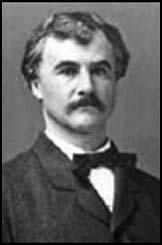Henry W. Davis

Henry Winter Davis was bornin Annapolis, Maryland on 16th August November, 1817. After graduating from Kenyon College he studied law at the University of Virginia.
Davis worked as a lawyer in Baltimore, where he became an active member of the Whig Party. In the dispute over slavery Davis refused to support the political factions on either side and in 1860 was elected to the House of Representatives as a member of the Union Party. Although critical of Abraham Lincoln, it was mainly due to Davis that Maryland did not secede from the Union.
On the outbreak of the Civil War Davis joined the Republican Party and in 1863 was re-elected to the House of Representatives. During the war Davis developed strong opinions against slavery and was associated with the Radical Republicans in Congress.
In 1864 Davis joined with Benjamin Wade in sponsoring a bill the that provided for the administration of the affairs of southern states by provisional governors until the end of the war. They also argued that civil government should only be re-established when half of the male white citizens took an oath of loyalty to the Union.
The Wade-Davis Bill was passed on 2nd July, 1864, with only one Republican voting against it. However, Abraham Lincoln refused to sign it. Lincoln defended his decision by telling Zachariah Chandler, one of the bill's supporters, that it was a question of time: "this bill was placed before me a few minutes before Congress adjourns. It is a matter of too much importance to be swallowed in that way." Six days later Lincoln issued a proclamation explaining his views on the bill. He argued that he had rejected it because he did not wish "to be inflexibly committed to any single plan of restoration".
The Radical Republicans were furious with Lincoln's decision. On 5th August, Davis and Benjamin Wade published an attack on Lincoln in the New York Tribune. In what became known as the Wade-Davis Manifesto, the men argued that Lincoln's actions had been taken "at the dictation of his personal ambition" and accused him of "dictatorial usurpation". They added that: "he must realize that our support is of a cause and not of a man."
Davis also opposed Andrew Johnson and his Reconstruction Plan before losing his seat in the House of Representatives in 1865. Henry Winter Davis, who returned to his law practice in Baltimore, died on 30th December, 1865.
Slavery in the United States (£1.29)

